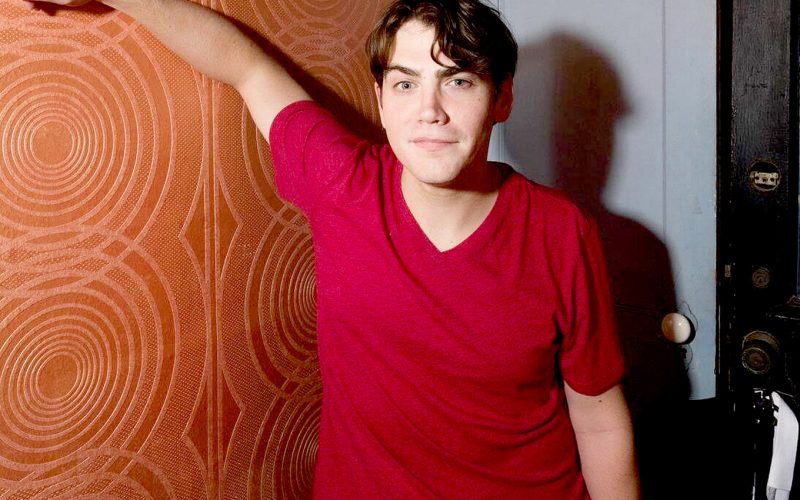
Courtesy Photo
Ex-Arkansas local John Burnette will be returning to Fayetteville to play a solo show at Stage Eighteen, Saturday, May 27.
An old Arkansas local musician is working his way back to Fayetteville after going wayward to Charlotte, N.C. In fact, his album cover art was shot in our very own Maxine’s Taproom.
The man is John Burnette, and the singer-songwriter is coming to Stage Eighteen in Fayetteville Saturday, May 27. The show will be solo, but he employs loop and effects pedals to beef up his sound.
His music on his self-titled LP, John Burnette pulls upon years of influences from country, folk, blues and his degree in jazz from his years living throughout Arkansas in his youth. His voice sounds distinctly like a clearer, less grungy Eddie Vedder. The record sounds meticulously put together and layered, and sounds as professional as most anything out there today. The music moves from pop rock to latin jazz and back to country — it’s a roller coaster.
We got the chance to talk with Burnette as he made his way back to the homeland:
TFW: Your record is pretty eclectic and varied in sound and style. Could you tell me about some of your musical influences that helped shape the record?
BURNETTE: A lot of it is sort of geographical. Arkansas doesn’t have a strict musical identity, but it has a lot around it. Traveling around, a lot of people don’t know where Arkansas is. I usually name drop Johnny Cash. Everyone seems to think its near Wisconsin or in the Midwest. I do think geography plays a role in it. You get the Texas singer-songwriter on one side then you got Tulsa and JJ Cale sound, then there’s the Ozark thing and then you get the Memphis thing with Stax soul and Sun Records, and then you go into the delta and Louisiana. Katrina kinda pushed up some jazz to Little Rock. I got to benefit from those guys coming up, who were fleeing their hometown, but started teaching in Arkansas. It’s a really cool place to have those other identities blow across you, if that makes sense. It’s the perfect place to be Americana-wise.
TFW: What inspired you to study jazz?
BURNETTE: Somebody said if you can play jazz, you can play anything. When I was younger I wanted to shred all the time. You got your pentatonics, but you can only take those so far. I started to mellow out a bit after the testosterone cooled off in my twenties. I definitely started appreciating the nuances about the harmonic side of jazz. It’s like how do you better explain a story better using harmonies rather than being stuck with a songwriter’s three chord guideline. It’s more like a research thing. Jazz is research to serve the narrative.
TFW: You’ve got yourself a pretty distinct, unique voice. How did you develop it?
BURNETTE: I never trained. I never had any vocal lessons. I sang as a kid. When I was studying, it was the quickest way to learn a melody, like the head of a jazz chart. By proxy, I got to study song formats and how they put words together. I tried to sing like other people and it just sorta always farts out on me. So I decided this is the voice I’ve got and to make the best of it. If I’m out there Whitney Houstoning it, it doesn’t necessarily look good on me [laughs]. One of my guilty pleasures was going to 2 a.m. karaoke after my regular jazz gig I had for a while. Most of the time we’d watch, but sometimes get up there.
TFW: What was the process for making the album? It sounds really well made.
BURNETTE: I made it live back in November. It was an involved process and it was my first time doing it so the timelines were sort of skewed out there I guess. We started making the record about a year before that. I put some scratch tracks down and recorded in Fellowship Hall where John Moreland recorded “Big Bad Luv”. I started recording and we ended up using the same microphones. We borrowed that room to get the drum tracks. Over the course of a few months because we had nothing of a budget we ended up recording in closets and bathrooms. We ended up going to houses and asking if we could record in them with acoustic panels. Finally, after we had been recording for a while the engineer Mark Colbert ended up partnering with a guy in Little Rock with a new studio that opened up at Capitol View Studios. We added some of the ornamental parts, like horns, percussion and back up vocals.
The way we approached it, was kind of like a Southern millenial concept album. You grow up, and you’ve got all these geographical sounds that blow across you, but you also grow up with guys like Chris Cornell, Jeff Buckley and Radiohead. You grow up in the artsy millenial thing. Some of that stuff bleeds in there. A lot of times a tunes would pop in my head that would sound good in this style or vien. I hadn’t written a song until like four years ago. At the tail end of my jazz degree I was looking for something different. I remember sitting down for a song and thinking I’m going to write a three chord song because I’d never done it before. Let’s focus on the words and how to write a song versus some of the bells and whistles you can put on it. I wrote it within the last five years.



